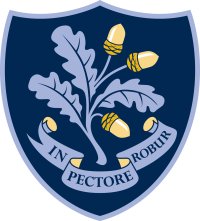Session T1 (Year Ten) - Saturday 12th October 2013
 Sunday, October 13, 2013 at 5:07PM
Sunday, October 13, 2013 at 5:07PM Today was Confront and Improve Day and the day sixteen Year Ten girls embarked on their third year of ESIP.
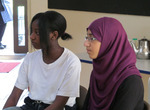 Michael reintroduced us to clean questions and we started by sharing with each other ‘our thoughts and feelings at this moment’. The girls took turns to share their thoughts and to ask clean questions such as “What kind of X is that X?” “Anything else about X,” “When X what happens next?” and “When X what would you like to have happen?” where X was the thought/feeling the other person wanted to clarify or understand better.
Michael reintroduced us to clean questions and we started by sharing with each other ‘our thoughts and feelings at this moment’. The girls took turns to share their thoughts and to ask clean questions such as “What kind of X is that X?” “Anything else about X,” “When X what happens next?” and “When X what would you like to have happen?” where X was the thought/feeling the other person wanted to clarify or understand better.
“My challenge is to use clean questions to find out more information in school or in a general conversation if I want to find out more or confirm something.”
Building on the work from their applications to Year Ten the girls then identified and clarified one area they wanted to improve on this year.
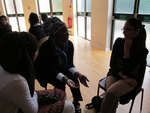 Next, we created our Well Formed Outcome. We learned the key criteria were: stated in the positive (not something you DON’T want to do), getting started and success or failure depends entirely on you, sufficient to move you to action and keep going at a comfortable pace, and is specific and measurable. The use of clean questions ensures we elicit answers which give us as much information as possible about the issue we are interested in. The girls were very open in their sharing.
Next, we created our Well Formed Outcome. We learned the key criteria were: stated in the positive (not something you DON’T want to do), getting started and success or failure depends entirely on you, sufficient to move you to action and keep going at a comfortable pace, and is specific and measurable. The use of clean questions ensures we elicit answers which give us as much information as possible about the issue we are interested in. The girls were very open in their sharing.
“Today I came up with a well formed plan to keep positive, happy and relaxed and thought about causes and effects.”
We then started a similar but kinesthetic exercise called SCORE – Symptoms, Causes, Outcomes, Resources and Effects. We set up a SCORE line of five bases (one for each letter/element) and Michael and Dona demonstrated the technique using the issue of ‘workload’.
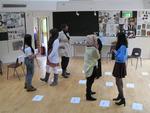 The girls then broke into pairs and each pair ran through the SCORE exercise (using SCORE bases – either walking a line or walking a circle) using clean questions to better understand the issues and come to clearer plans, outcomes and effects by better distinguishing symptoms from causes and deciding what resources they needed and could put in place. One of our students then modeled her experiences of boiling anger and learned how she could overcome the frustrations which build up over the day – ‘kettle-kontrol’.
The girls then broke into pairs and each pair ran through the SCORE exercise (using SCORE bases – either walking a line or walking a circle) using clean questions to better understand the issues and come to clearer plans, outcomes and effects by better distinguishing symptoms from causes and deciding what resources they needed and could put in place. One of our students then modeled her experiences of boiling anger and learned how she could overcome the frustrations which build up over the day – ‘kettle-kontrol’.
“I was able to achieve a bigger view at things that I keep a closed answer for. I was able to realize my main area for improvement. This will help me as I will later develop this and improve on it.”
We selected our accountability buddies and made formal declarations to video of what we were committing to improve this year (our Well Formed Outcome) and how we would know we were making progress.
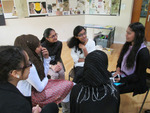 We wrapped up the day with a summary of what we had covered and finished on the three axioms of accountability – the accountability myth (that we have been as effective as we should be, it’s their fault), the accountability assumption (people are doing their best to fulfil your expections) and the accountability truth (look at yourself, what’s wrong with what you’re doing).
We wrapped up the day with a summary of what we had covered and finished on the three axioms of accountability – the accountability myth (that we have been as effective as we should be, it’s their fault), the accountability assumption (people are doing their best to fulfil your expections) and the accountability truth (look at yourself, what’s wrong with what you’re doing).
“I learned about the axioms of accountability – how people can shift blame when really they need to hold themselves accountable.”
All in all, a very productive day having learned how to set outcomes, the important of commitment, how accountability works in practice alongside becoming much better at clean questions and communication to make some practical changes to our lives to help us in the future.
See more photos in the Gallery
 ESIP Forest | Comments Off |
ESIP Forest | Comments Off | 

